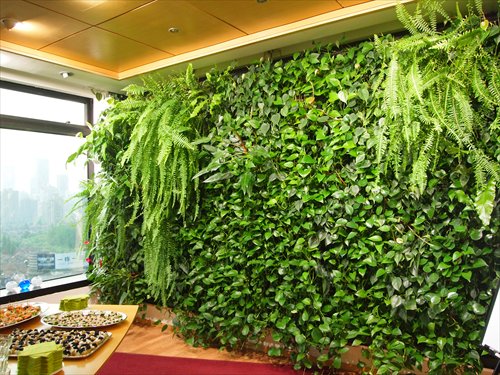Going green in the workplace
It might be shocking for many to learn that every year, as many as 111,000 people in China die as a result of indoor air pollution, a number that is equivalent to the casualties caused by car accidents.
According to a 2014 report by the Environment Test Center of China National Interior Decoration Association, approximately 300 varieties of pollutants can be detected in an indoor environment, and 68 percent of human diseases are related to indoor air pollution. These pollutants mainly originate from architecture renovations.
While many Shanghai residents have developed the habit of checking air quality indexes (AQI) to avoid going out on heavily polluted days, the average person is ignorant to the fact that their offices, where they spend a majority of their days, are inflicting health hazards in a subtle yet even more lethal way.
As a result of this revelation, the Swedish consulate in Shanghai recently renovated their office by lining its walls with plants. This vertical garden, known as a plantwall, is a groundbreaking design that is sure to enhance the office's style. But for this health-conscious consulate, the physical benefits of going green far outweigh the aesthetic value.
Plants don't require energy
Viktoria Li, the Swedish Consul General in Shanghai, told the Global Times that the consulate became more conscious about the environment after the air quality in Shanghai started to deteriorate last year. Their first step was to improve their immediate surroundings.
"Part of our responsibilities as diplomats involves cooperating with the Chinese on environmental techniques such as plantwalls to improve the environment. But we thought we should first try it out here in our little microcosm," Li said.
"For the average office space, the most common carcinogenic chemicals are formaldehyde and benzene," Dr Fei Gang, an eyes-nose-throat (ENT) specialist with ParkwayHealth in Shanghai, told the Global Times. "These carcinogens can harm people's health by damaging our immune system."
The doctor continued to say that most dangerous chemicals originate from paint and office furniture. Using a carbon filter or electric air purifier are just some of the more common ways to reduce the toxicity of these chemicals. The Swedish consulate, however, decided to go with a more sustainable method - plants.
"The nice part about plants is that you are not purifying your own air by destroying someone else's, which is what happens with electric filters and purifiers. Unlike those devices, plants don't require energy to grow."
According to Antoine Blancher at Green Fortune, the project director in charge of the consulate's renovation, integrating green spaces into a modern urban office requires no small amount of planning.
"Usually three plants are needed per cubic meter," Blancher told the Global Times, but added that the real challenge is how to keep them healthy in the long run. "Plants clean the air by breathing, but only healthy plants can breathe properly to reach our purpose," he said.
After installing a plantwall, Green Fortune sends their staff to maintain the sensitive folliage once every couple of weeks. Yolanda Vom Hagen, also with Green Fortune, said that there are many species of purifying plants, but which specific species they use in an office depends on the exact conditions of that office.
"We select a species according to whether it's a colder environment or a warmer one, with natural light or not. Generally, the more natural light an office has, and the warmer it is, the more varieties of plants we can choose from," she told the Global Times.
Minimal is best
Carcinogenic chemicals are not the only pollutants found in an office. Mold and dust in central air-conditioning systems and acarids (mites) living in the carpet are also extremely hazardous to one's health.
"There have been a growing number of cases of infection by mold, which spreads in the air. Central air-conditioning systems are damp, which is a favorable condition for mold to thrive," Dr Fei said, adding that air-conditioning pipes also host cockroaches and rats, which causes more bacteria. The doctor suggested that employees should face away from air-conditioning vents and that AC filters should be washed on a regular basis.
As carpets normally host a large population of mites, Dr Fei also suggests that offices have bare floors. "An office or a working space should be as spare and minimalist as possible. Employees should keep as few possessions as possible, and the company should use only simple furniture."
Regarding if it's necessary for office workers to wear masks when indoors, Dr Fei said it's only a short-term solution to a much bigger problem. "Basically, if your office's air makes you feel dizzy or causes you a sore throat, then it is no longer an environment that is safe for you to stay."
"Besides, a mask like N95 could lead to an insufficient level of oxygen. Nor do I suggest people wear masks on days when the AQI is lower than 150. We have to calculate both the advantages and disadvantages," the doctor said.

A plantwall at the Swedish consulate in Shanghai
Photo: Ni Dandan/GT